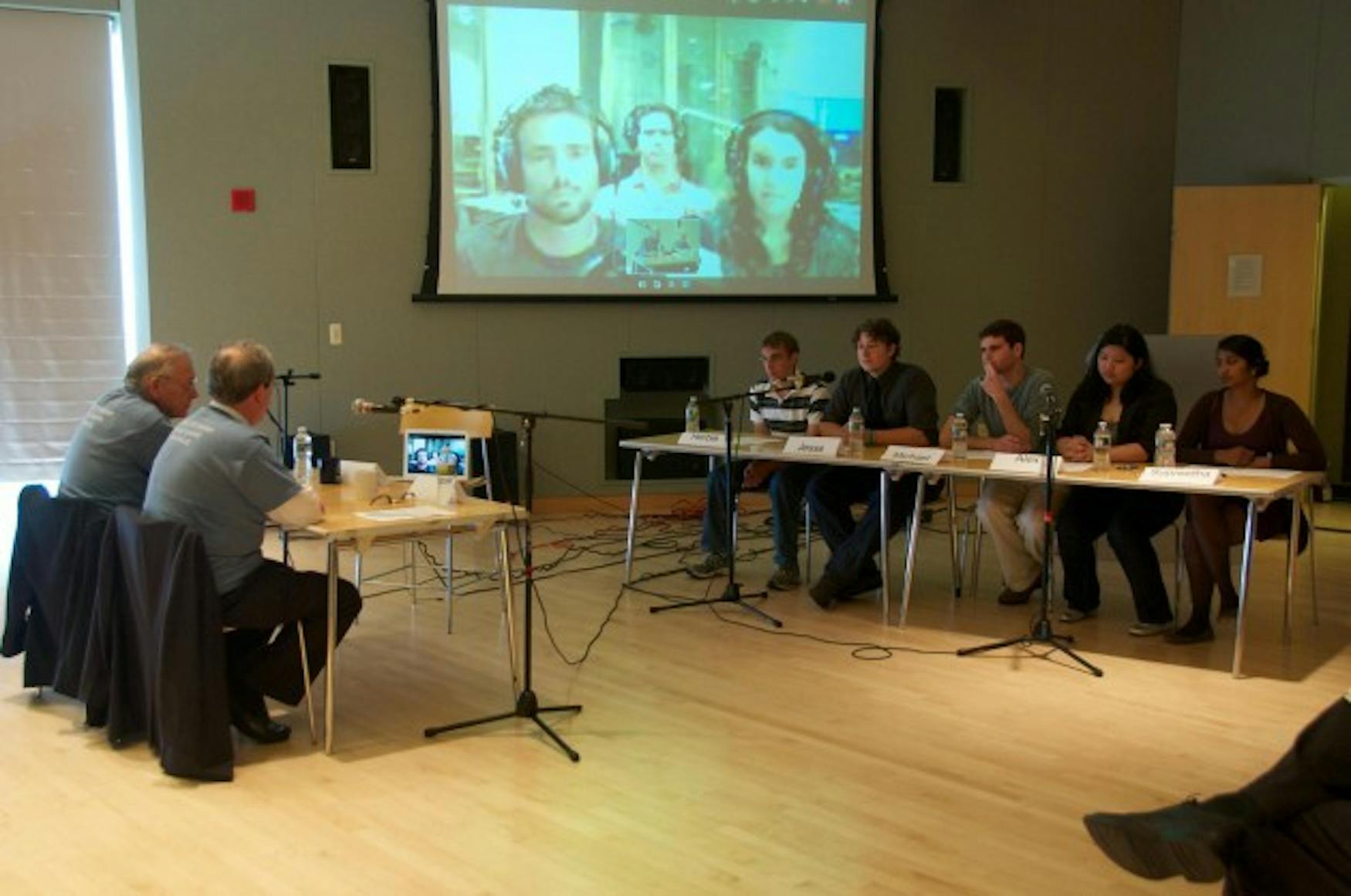Lawrence and Reichman discuss higher education
Last Thursday, University President Frederick Lawrence and President of the Interdisciplinary Center in Israel Uriel Reichman answered questions from Brandeis and IDC students concerning higher education, student life on campus and approaching cultural differences in an academic setting.
The event, titled "Interview with the Presidents," was held in the Multipurpose Room in the Shapiro Campus Center and was broadcasted live on the WBRS radio station and on its website. Two students from the IDC, Maggie Baruch and graduate Yona Lador, were present via video chat projected onto a screen. The show was later broadcasted on the IDC radio station, Associate Dean of Student Life Jamele Adams said in an interview with the Justice.
The IDC is located in Herzliya, Israel and was founded by Reichman in 1994. According to its mission statement on the IDC website, the goals of the university are to "cultivate freedom of thought, research, and self-realization" and to "imbue its students with a broad cultural background and a vision that has international horizons."
Lawrence visited the IDC during his trip to Israel in June. This event, Moderator Michael Perloff '12 said in his introduction, was a collaborative effort between the IDC and Brandeis and "represents the first move toward a partnership between" the two schools.
The Brandeis student panel was comprised of Perloff, co-moderator Jesse Manning '13, Student Union President Herbie Rosen '12, Alex Chum '12, and Supreetha Gubbala '12. Each of the panelists was chosen because of their extra- and co-curricular involvement.
Lawrence and Reichman began the event by donning complimentary WBRS shirts over their formal attire. Manning began by asking what the presidents believed the role of a college education to be in the job search process, particularly an undergraduate degree in a job market that often requires further qualifications.
Lawrence responded by emphasizing the importance of an interdisciplinary education, referencing to the tendency of Brandeis students to take classes outside of the field in which they plan to major. It is important for education to focus on communication, analysis and critical thinking skills, he said, so that students can turn "information into knowledge and hopefully turn that knowledge into wisdom."
"We're not training you just for your first job, but we're training you for your third and your fifth job," Lawrence said.
Reichman said that because Israeli students serve for 3 years in the army before attending university, undergraduate degrees are typically more professional. Like Lawrence, Reichman emphasized the importance of creativity and independent thinking, saying that a goal of the IDC is "inching people to think rather than provid[ing] information." The IDC also has a strong focus on political, social and business leadership, he said.
In response to a question from Rosen asking how the presidents would change their respective institutions to "better fit the current times" and competitive job market, Reichman stressed the importance of intensive, individualized and "transdisciplinary" education with a global focus.
Lawrence spoke about embracing the growing role of technology in the education process and about challenging the "false dichotomy between theoretical and practical" by incorporating more experiential learning into curricula.
Chum posed a question about the impact of student media platforms on campus life. In his response, Lawrence said that student media can both help communicate with and challenge the administration. As a "portal out to the entire world," publications can now instantly disseminate information worldwide, he said, and this position brings with it both more opportunities and more responsibilities.
The IDC has two daily student publications, one in English and one in Hebrew, Reichman said. He said that it is important for student publications to understand "that they will have an impact on the future."
In response to a question from Baruch about Brandeis' views on Judaism and Israeli nationality, Lawrence asked whether she wanted the "2-minute" version or the "2-hour" version.
He continued by discussing how Brandeis' Jewish roots have influenced the school's values and by emphasizing the University's strong Israel, Middle East and Judaic studies programs, which are designed "not in a way that is narrow and sectarian but in a way that is broad and open to all."
Reichman spoke of Judaism's universal message, which promotes "working for the same ideas [of] justice for all" and offers a "vision or a practical answer" for a peaceful world, he said.
Gubbala asked the presidents about approaching culturally sensitive topics and "cross[ing] cultural boundaries safely" in academic settings.
Lawrence said that it is important to "engage in hard, difficult topics" while maintaining ground rules of civility and respect. He emphasized challenging others' views rather than delegitimizing them, which is "antithetical to what [an] academic community is about."
Reichman said that in order to "see that other [opposing] party is a human being like you," it is essential to reach out and initiate a dialogue. If politicians had this approach, Reichman said, "maybe we would live in a different world."
Ilanna Nivasch '13, who attended the event, said in an interview with the Justice that the program and its unique format were "really exciting."
"I think it's great that we were able to … have this collaboration with [the IDC]," she said.
Adams, the associate dean of student life who assisted in coordinating the event, said in an interview with the Justice that it was "incredible" to "experience the bridge that was built" between the IDC and Brandeis. The relationship between the two schools will continue with further radio talk-show and music exchanges, he said.
"Both the Brandeis family and the IDC family were extended on that day," said Adams.



Please note All comments are eligible for publication in The Justice.